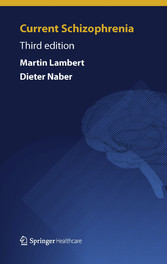Search and Find
Service
Current Schizophrenia
Advances in pharmacotherapy and psychosocial interventions continue to improve the success of managing schizophrenia. Early detection and intervention in people with, or at risk for, psychosis give patients and their families hope for a better course of illness and an improved outcome. The interdisciplinary approach, combining pharmacotherapy and psychosocial interventions, markedly increases the chance of long-lasting remission and recovery. However, a cure for schizophrenia has yet to be found. Research, particularly in the past decade, has revealed some of the biological and genetic facets of the origins of schizophrenia, and this has contributed to the better quality of treatment. This book aims to provide a short but detailed overview of current standards of care in schizophrenia. It takes into consideration several treatment recommendations proposed in published guidelines for schizophrenia, including the guidelines by the National Institute for Health and Clinical Excellence (2009), the American Psychiatric Association (2004), the Canadian Psychiatric Association (2005), and the Royal Australian and New Zealand College of Psychiatrists (2005). A major problem with guidelines such as these is the difficulties encountered in translating them into daily clinical practice. Therefore, the fundamental aim of this book is to present the guidelines as clearly as possible in the context of relevant clinical treatment issues. The book does this with the help of figures that provide the clinician with algorithms and summaries of the most important information required for the practical treatment and theoretical understanding of schizophrenia.
Martin Lambert is a professor of psychiatry at the University of Hamburg, where he is the head of the Psychosis Center, which includes the Psychosis Early Detection and Intervention Center (PEDIC). He performed his psychiatric training at the Department of Psychiatry and Psychotherapy at the University Medical Center in Hamburg, Germany. During his training, he spent 2 years at the Early Psychosis Prevention and Intervention Centre (EPPIC) in Melbourne, Australia. Professor Lambert's current research interests include the pharmacological and psychosocial treatment of schizophrenic, bipolar, and first-episode psychosis patients, and, especially, aspects of integrated care, remission and recovery, quality of life, and subjective wellbeing. Professor Lambert is the head of the network for a better mental health in Hamburg, which was founded by the German Research Association. He is the editor and author of several books about schizophrenia and has published various articles on schizophrenia and first-episode psychosis. Dieter Naber has been the director of the Psychiatric University Hospital in Hamburg, Germany, since 1995. After studying medicine in Göttingen and Bonn, Germany, Professor Naber worked at the Psychiatric Hospital of the University of Munich, Germany, from 1977 to 1995 as a ward doctor and then as a senior physician. In 1987, he gained a postdoctoral lecturing qualification with his lecture 'The etiological and therapeutic significance of endorphins in endogenous psychosis.' Professor Naber conducted research during two periods at the National Institute of Mental Health, in 1978-1980 and again in 1984-1985. His current research concentrates on long-term neuroleptic treatment, efficacy and side effects of second-generation neuroleptics, and the subjective effects of neuroleptics.
All prices incl. VAT












